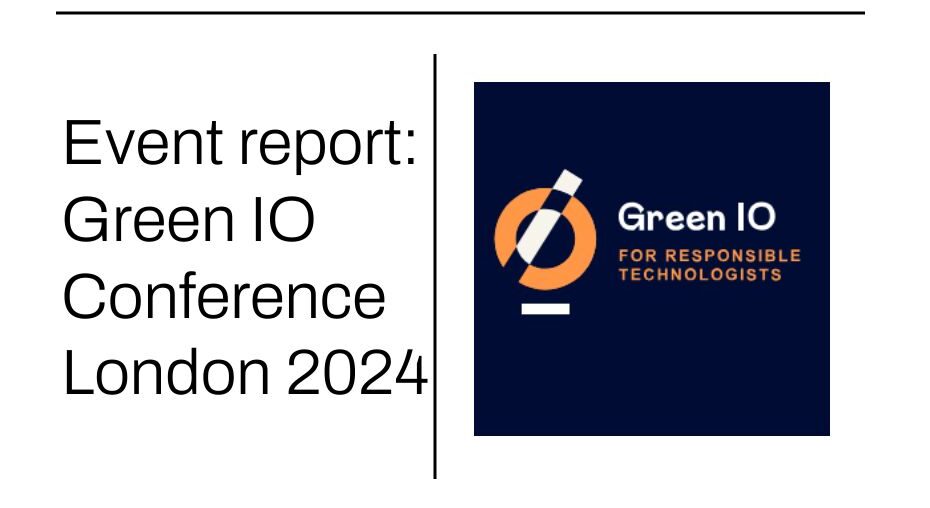Earlier this year, Fershad Irani, our Green Web Studio developer spoke at Green IO Conference in Singapore, about understanding digital carbon emissions. This September it was Chris, our executive director’s turn, speaking at Green IO Conference London. The event was a significant step up in size from last year, with 18 talks in a single track format. In this post, Chris shares some of our key takeaways and highlights from the event.
First of all – what is the Green IO Conference?
You can think of the Green IO Conference series as the event series to accompany Green IO, the podcast and newsletter aimed at responsible technologists interested in digital sustainability, and the Green IO Conference London was one of the only events of its size this year specifically focussed on the sustainability of digital services.
It runs in parallel with the API Days conference, in the same venue, and works as both an on-ramp for attendees curious about the new field of digital sustainability, but also a valuable place for practitioners to meet (often for the first time).
Why was the Green Web Foundation there?
We want to see the field of digital sustainability grow, and we’ve been fans of the Green IO’s podcast for years. Some of our staff have been guests there, and Gael Duez, one of the faces of Green IO has been a guest on Environment Variables, we host as well.
I also delivered the opening keynote of the event, with a talk called Consensus as a Climate Lever. It was a tour of how the field has developed over the last few years, with de-facto standards developing as our knowledge improves about how to measure the environmental impact of digital services. It also covered where we see some of the opportunities opening up with new laws being passed, and new standards being accepted in our industry – particularly with a new project we’re working on called carbon.txt.
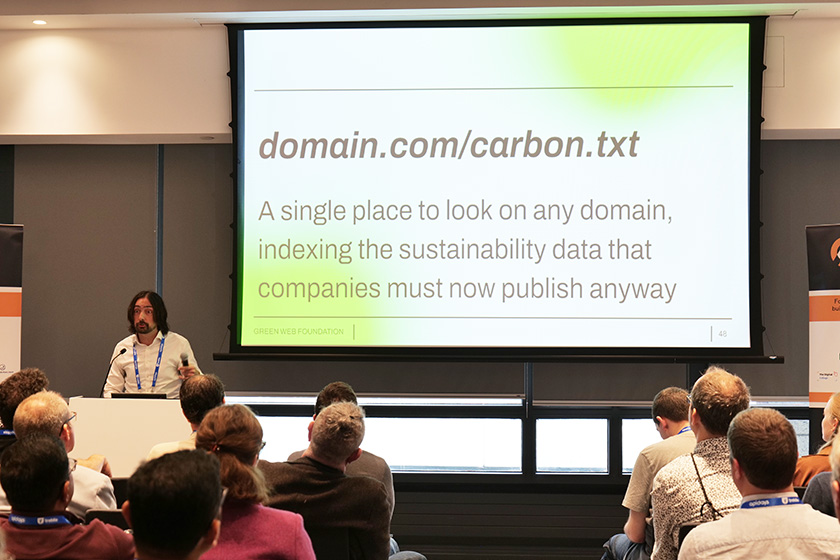

If you’d like to know more, the full deck, with links and detailed notes is available on the event page.
Top 3 takeaways
Green IO Conf London was a single track conference, with 18 sessions in a single day, which is a lot of content. Every talk and panel was recorded, and APIDays usually puts its talks online a few weeks after the conference. When they’re up, we’ll update this blog post to link to them.
In the meantime, and to keep this post manageable, I’m going to share a few talk highlights that really caught my attention, and for each highlighted talk, I’ll share at least one specific insight that I can see being used outside the conference.
Github’s public steps into digital sustainability
It might be because his talk came directly after mine, but Paul Young’s talk, looking at the ecosystem developing around digital sustainability on Github really caught my eye.
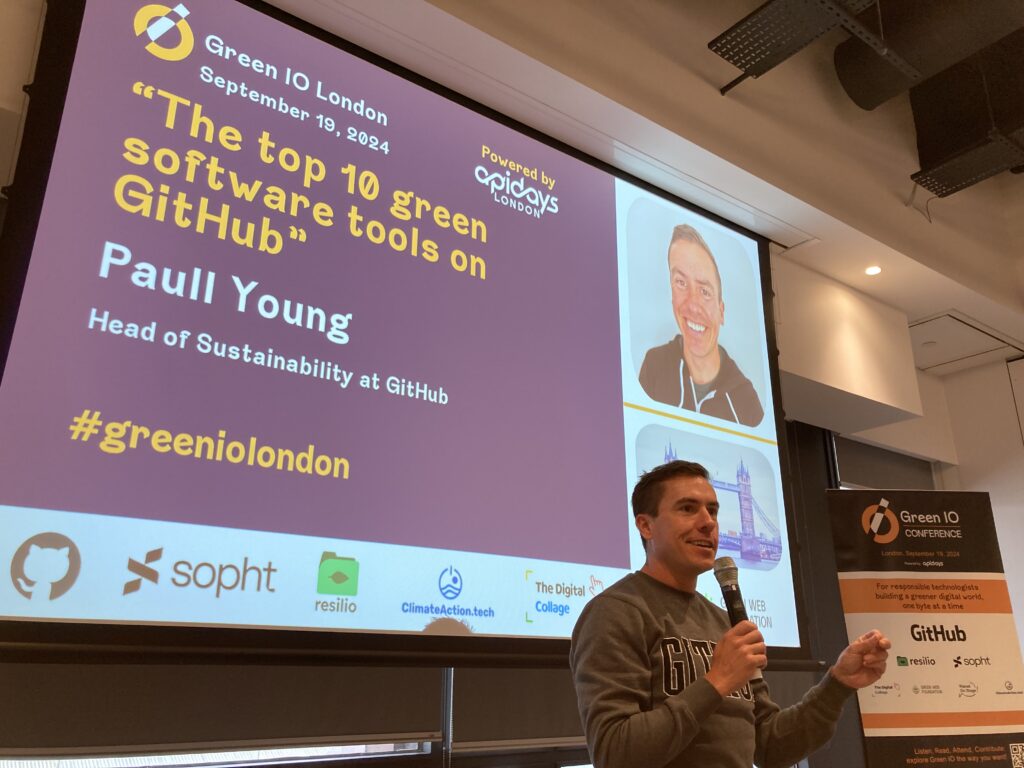

Github operates the largest single platform with the largest population of developers actively using it, so it’s not really surprising to see them show some information about how it’s used for building more sustainable digital services. The talk presented was largely a list of top 10 green software tools on github (we’re number 7 with CO2.js – huzzah!), and it presented an actively curated list aimed developers looking for tools to use themselves, in the form of their Green Software Directory.
One of the key things I took away from this is that sustainability in software is now starting to come into the mainstream. This partly as a response to policy drivers, sure, but it also reflects a growing interest among technologists, and this growth is increasingly visible through networks like github.
I found out after the talk that the Github blog will be featuring some of these top ten projects in the coming weeks, with demos for people new to each project. In the meantime, you can see the deck yourself, and see if you recognise any of the projects in the top ten.
Tales from the trenches with Cloud Carbon footprint , and the intrinsic motivation
Another highlight was Mark Butcher of Posetiv’s talk, which did two things: a) debunk a bunch of myths around digital sustainability, and b) give some fascinating insights into what really drives organisations to adopt sustainability in digital work.
If you follow Mark Butcher on LinkedIn, you’ll know he has an extremely low tolerance for Greenwash and is not shy about calling it out. Mark’s talk was one of the best examples we’ve seen of Critical assessment of industry sustainability claims, something we have been highlighting the need for since our first report on digital sustainability, The Fog Of Enactment back in 2022.
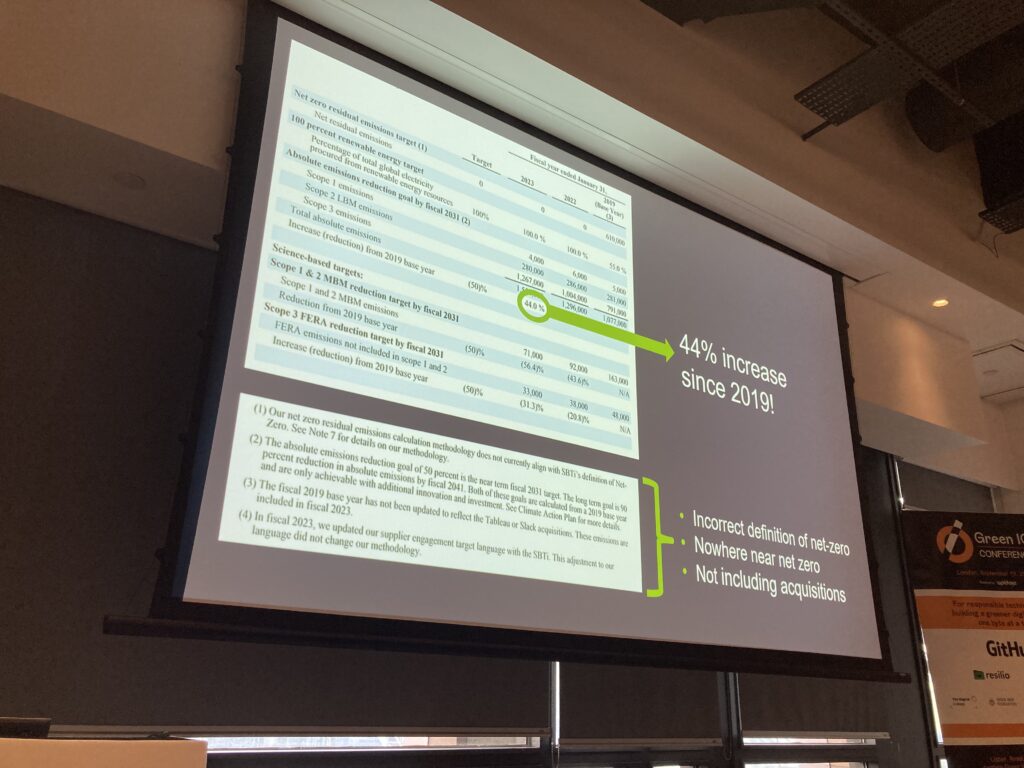

Given a stage here, he did exactly that, explaining why this is such a problem. In a field where the most people being asked to take carbon reduction measures aren’t trained to critically assess claims by suppliers, we end up with a governance problem because technology ends up being a part of an organisation with disproportionate risks around under-declaring emissions – something that carries greater consequences with time.
He also shared a couple of fascinating case studies, showing how tapping into the intrinsic motivations of staff around climate delivered better results for reducing costs AND emissions than just talking about saving costs on cloud bills.
When you step back, the logic makes sense – if you work in company, it’s the organisation that mainly benefits from you cutting costs, and these don’t always translate into any extra private upside for you personally. However if you’re viewing it through a climate lens, it starts to look different – as Mark said, we might have different wallets, but all we share the same planet.
See the deck for Marks Butcher of Posetiv’s talk – Cloud Carbon Footprint – A View from the Trenches
Risks and Impacts in the world of AI with the UK Government
The final highlight for me was one of the last talks of the day, by Ishmael Burdeau, of the UK government’s Department of Work and Pensions (DWP), explaining how they think about the Environmental consequences of adopting digital services.
When thinking about innovation and digital sustainability, a ginormous government department might not immediately spring to mind, but that size also translates into a colossal amount of spending on digital services – something in the region of a billion pounds on IT services each year.
Ishmael’s talk detailed from the perspective of someone responsible for designing and delivering a government service where the levers for impact might be, and one of the key takeaways from the talk, was that while it’s fun to talk about coding efficiency, it’s often one of the smaller levers available – there are much larger ones earlier in the process, as depicted in the slide below:
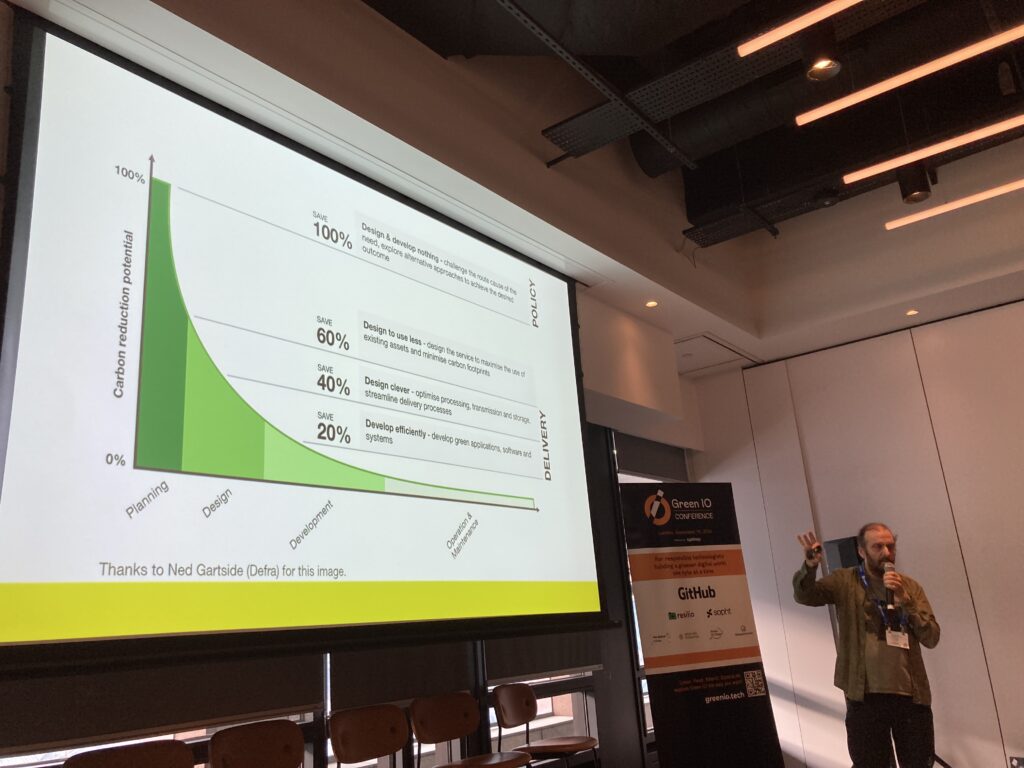

The other was how important it was to avoid confusing risks, which are things that might happen, and impacts, which are things that are happening right now. In much of the discourse around AI, there’s a real focus on AI risks, as things that to be weighed against the potential upsides that might justify them. When we do this, we often end up missing out on the very real impacts happening as a result of the build out of so much new digital infrastructure that are already happening.
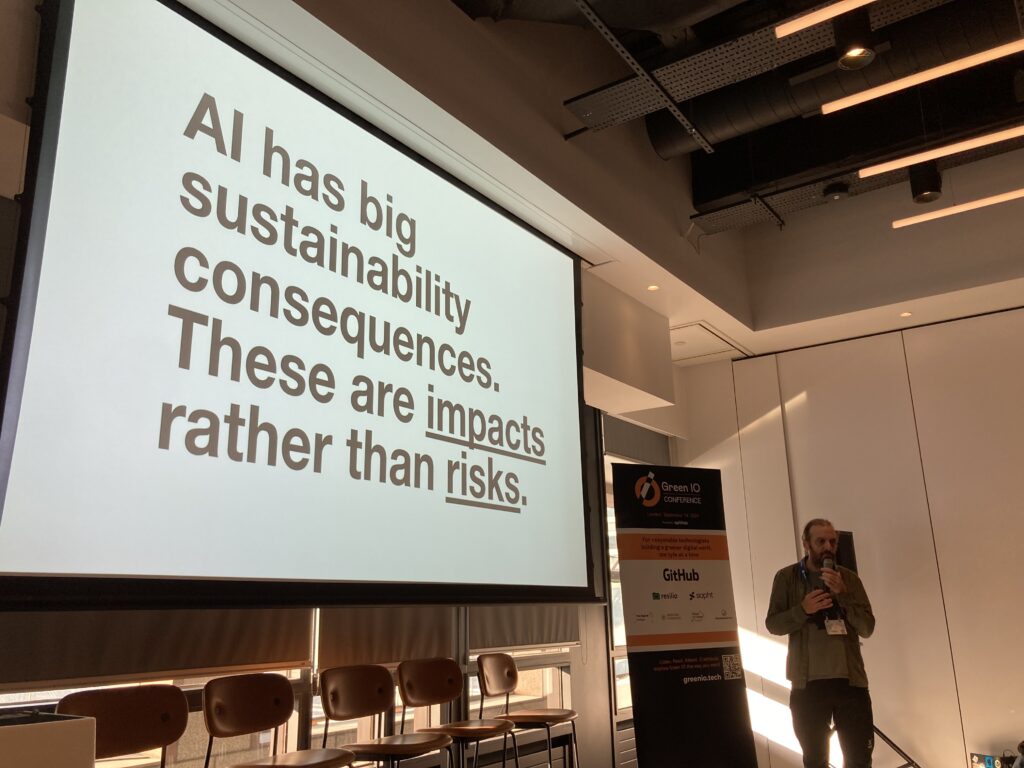

Seeing it laid out so clearly was really memorable.
Like the others, Ishmael’s deck is also online for your perusal.
Where to look for more: online, and in Paris
We’re not the only people who have written about the Green IO conference in London. There some other stellar writeups online if you couldn’t make it. Maggie Hunt has a good detailed writeup on her blog, as does the climateAction.tech community blog, and the original post by Gael Duez on linkedIn has a series links to other accounts of the day too.
If you’re curious about further events, there is also a Green IO conference in Paris in December 2024, where our Director of Operations, Hannah Smith will be presenting, along with a whole set of events on in 2025 – you can see their site for the full list.
We’ve found the Green IO conferences worthwhile places to spend time – if you’d like to speak to folk from the Green Web Foundation, you can find out when we’ll be at future ones in our monthly newsletter, where we share future appearances, and other insights as we work towards a fossul free internet.
